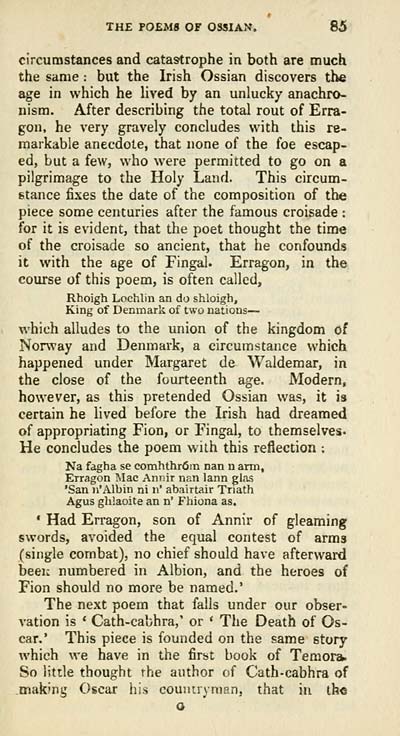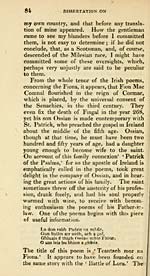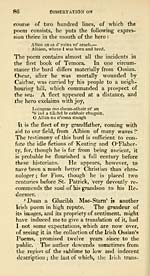Ossian Collection > Poems of Ossian
(97)
Download files
Complete book:
Individual page:
Thumbnail gallery: Grid view | List view

THE POEMS OF OSSIAN. 85
circumstances and catastrophe in both are much
the same : but the Irish Ossian discovers the
age in which he lived by an unlucky anachro-
nism. After describing the total rout of Erra-
gon, he very gravely concludes with this re-
markable anecdote, that none of the foe escap-
ed, but a few, who were permitted to go on a
pilgrimage to the Holy Land. This circum-
stance fixes the date of the composition of the
piece some centuries after the famous croisade :
for it is evident, that the poet thought the time
of the croisade so ancient, that he confounds
it with the age of Fingal. Erragon, in the
course of this poem, is often called,
Rhoigh Lochlin an do shloigh.
King of Denmark of two nations —
which alludes to the union of the kingdom of
Norway and Denmark, a circumstance which
happened under Margaret de Waldemar, in
the close of the fourteenth age. Modern,
however, as this pretended Ossian was, it is
certain he lived before the Irish had dreamed
of appropriating Fion, or Fingal, to themselves-
He concludes the poem with this reflection ;
Na fagha se comhthr6in nan u arm,
Erragon !Mac Annir nan lann glas
'San n'Albin ni n' abairtair Triath
Agus ghlaoite an n' Fhiona as.
• Had Erragon, son of Annir of gleaming
swords, avoided the equal contest of arras
(single combat), no chief should have afterward
becK numbered in Albion, and the heroes of
Fion should no more be named.'
The next poem that falls under our obser-
vation is • Cath-cabhra,' or ' The Death of Os-
car.* This piece is founded on the same story
which we have in the first book of Temora.
So little thought rhe author of Cath-cabhra of
making Oscar his coumryman, that in the
circumstances and catastrophe in both are much
the same : but the Irish Ossian discovers the
age in which he lived by an unlucky anachro-
nism. After describing the total rout of Erra-
gon, he very gravely concludes with this re-
markable anecdote, that none of the foe escap-
ed, but a few, who were permitted to go on a
pilgrimage to the Holy Land. This circum-
stance fixes the date of the composition of the
piece some centuries after the famous croisade :
for it is evident, that the poet thought the time
of the croisade so ancient, that he confounds
it with the age of Fingal. Erragon, in the
course of this poem, is often called,
Rhoigh Lochlin an do shloigh.
King of Denmark of two nations —
which alludes to the union of the kingdom of
Norway and Denmark, a circumstance which
happened under Margaret de Waldemar, in
the close of the fourteenth age. Modern,
however, as this pretended Ossian was, it is
certain he lived before the Irish had dreamed
of appropriating Fion, or Fingal, to themselves-
He concludes the poem with this reflection ;
Na fagha se comhthr6in nan u arm,
Erragon !Mac Annir nan lann glas
'San n'Albin ni n' abairtair Triath
Agus ghlaoite an n' Fhiona as.
• Had Erragon, son of Annir of gleaming
swords, avoided the equal contest of arras
(single combat), no chief should have afterward
becK numbered in Albion, and the heroes of
Fion should no more be named.'
The next poem that falls under our obser-
vation is • Cath-cabhra,' or ' The Death of Os-
car.* This piece is founded on the same story
which we have in the first book of Temora.
So little thought rhe author of Cath-cabhra of
making Oscar his coumryman, that in the
Set display mode to: Large image | Transcription
Images and transcriptions on this page, including medium image downloads, may be used under the Creative Commons Attribution 4.0 International Licence unless otherwise stated. ![]()
| Early Gaelic Book Collections > Ossian Collection > Poems of Ossian > (97) |
|---|
| Permanent URL | https://digital.nls.uk/77573933 |
|---|
| Description | Selected books from the Ossian Collection of 327 volumes, originally assembled by J. Norman Methven of Perth. Different editions and translations of James MacPherson's epic poem 'Ossian', some with a map of the 'Kingdom of Connor'. Also secondary material relating to Ossianic poetry and the Ossian controversy. |
|---|
| Description | Selected items from five 'Special and Named Printed Collections'. Includes books in Gaelic and other Celtic languages, works about the Gaels, their languages, literature, culture and history. |
|---|

